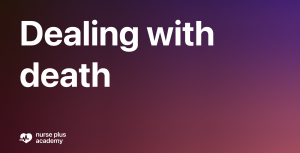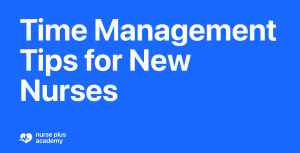How to Become a Nurse:
Your Nursing Career Guide

Weight Bias and Obesity Discrimination
Every nurse knows they must give equal care to their patients, regardless of the patients’ status or situation. They also know they must regularly examine their own attitudes to recognize negative opinions and perceptions regarding certain types of patients. If discrimination is present—whether intentional or not--it can significantly impact the quality of care.Discrimination is defined as the unfair or prejudicial treatment of pe ...

When You Make a Mistake
Every new nurse dreads making a mistake. Any experienced nurse will tell you: It’s not “if” but “when.” Mistakes happen in every part of life. We miscalculate how much money is in our bank account and we overspend. We don’t notice the car in front of us has stopped suddenly and we cause a fender-bender. We forget about the birthday cake in the oven until the smoke alarm reminds us. Our careers are no differ ...

Using YouTube to Study for NCLEX
As you study for your NCLEX, it can be a good idea to use several resources to help you retain information. YouTube has become an effective way to review nursing content for your exam. A paper by Clifton and Mann stated, “We found that the use of YouTube videos increased student engagement, critical awareness and facilitated deep learning.” Adding YouTube to NCLEX studies has benefits YouTube provides a wide range of videos to supplem ...

Black Box Warnings: What Every Nurse Should Know
Black Box Warnings: What Every Nurse Should Know Black Box Warnings: Just the words sound serious. And they are. The U.S. Food and Drug Administration (FDA) requires a Black Box Warning (also called a black label warning or boxed warning) to be placed on medications that carry critical safety risks. It’s the FDA’s strictest labeling requirements that the FDA can mandate for prescription drugs. The name comes from the black border sur ...

Help! I Failed My NCLEX
You graduated from nursing school. The only hurdle between you and your new professional career was passing the National Clinical Licensure Examination (NCLEX). NCLEX has only one purpose: to evaluate the ability of new graduate nurses—both RN and PN—are capable of providing safe care to patients.The NCLEX is not an easy examination. It covers the entire range of your nursing education. Questions—called test items—are ...

Dealing with Death: How to Help Others—and Yourself
It’s inevitable. As a nurse, you will witness death. You will sit with a dying patient; you will support a grieving family. You’ll cry at times with them, as well as with co-workers and by yourself.One of the hardest aspects of nursing is dealing with death: knowing what to say to someone whose life is ending and how to comfort those left behind. Then there is caring for yourself when death can happen daily, and you’re expec ...

Time Management Tips for New Nurses
One of the biggest challenges for a new nurse is to learn to navigate through a busy shift. There’s so much to do: patient assessments, passing medications, doing treatments, preparing for procedures and discharges…and that’s without the inevitable urgent events that can happen at any moment. How can so much be squeezed into 8 or 12 hours?Time management is essential from your first day on the job. In a recent ANA webinar ...

Humor in Nursing
You won’t find test items on humor when you sit for your NCLEX. And there probably wasn’t a chapter on telling jokes during your nursing education. Yet humor is one of a nurse’s best tools and an accepted part of nursing practice. Laughter is good for you, your co-workers, and your patients.Humor is a crucial component of life. Every human is born with a sense of humor, and every culture has its own form of comedy. Mark Twain ...

You Are More Than “Just a Nurse”
Have you ever heard this: “Oh, so you’re just a nurse. Why didn’t you become a doctor?” Or: “Nurses only do what the doctors tell them.” Or “Nurses are really doctor assistants.” Maybe you have even said it about yourself: “I’m just a nurse.”It’s time for every nurse to stop being humble and self-deprecating. Remember that every year since it began, the Gallup Poll finds th ...